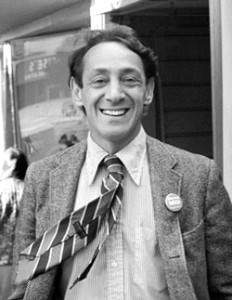 Harvey Milk might be the most important figure in the modern LGBT movement. In fact, many point him as a catalyst for the formation of the LGBT community as we know it. Milk moved to San Francisco in the early 70s and there felt comfortable embracing his homosexuality and displaying his pride. He opened a small camera shop in the Castro District where he became a fixture of the community. People came to him with their problems and he did his best to help them. Soon enough he was known as the unofficial Mayor of Castro Street.
Harvey Milk might be the most important figure in the modern LGBT movement. In fact, many point him as a catalyst for the formation of the LGBT community as we know it. Milk moved to San Francisco in the early 70s and there felt comfortable embracing his homosexuality and displaying his pride. He opened a small camera shop in the Castro District where he became a fixture of the community. People came to him with their problems and he did his best to help them. Soon enough he was known as the unofficial Mayor of Castro Street.
Milk’s passion for solving problems in his community drove him into politics. He waged several campaigns for office, losing each one but gaining more of a following and influence each time. Finally in 1977, Milk won the race for city supervisor. As one of the first openly gay elected officials, he immediately became a beacon of hope and inspiration for the LGBT community. Milk worked to promote equality and fairness for all groups. In a major victory, he helped shoot down an oppressive anti-gay proposition that would have forced the firing of gay and lesbian teachers in state schools. His eloquence and energy captured the attention of the nation and allowed him to kick off the LGBT movement as we know it.
On November 27, 1978, after only a year in office, Harvey Milk, along with San Francisco mayor George Moscone, was assassinated by colleague Dan White. His death was a tragic loss but he left behind a legacy that continues to spark the will of activists today. Named one of the most influential people of the 20th century by Time Magazine, Harvey Milk was a trailblazer for the LGBT community and an icon of the crusade for equality.
Learn More About Harvey Milk: